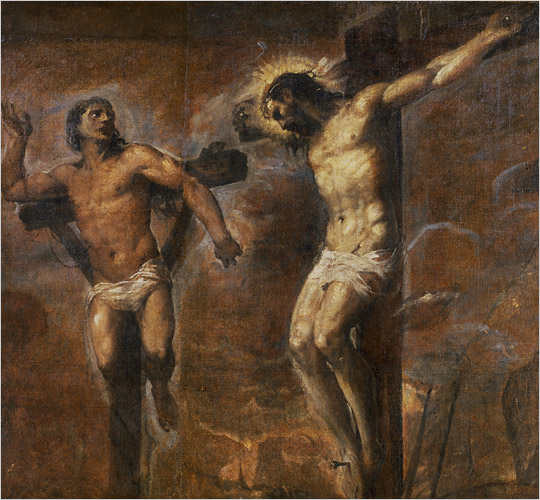Luke 23
“Into Thy hands I commend My spirit.”
Luke 23
44 And it was about the sixth hour, and there was darkness over the whole land until the ninth hour.
45 And the sun was darkened, and the veil of the temple was ripped in the midst.
46 And calling out with a great voice, Jesus said, Father, into Thy hands I commend My spirit3. And having said these things, He let out the spirit.
47 But when the centurion saw what came to pass, he glorified God, saying, Truly this was a just Man.
48 And all the crowds who came together to that sight, beholding the things that were done, striking their chests, returned.
49 And all His acquaintances, and the women who followed with Him from Galilee, stood afar off, beholding these things.
AC 1812. …While He lived in the world the Lord was in continual combats of temptations, and in continual victories, from a constant inmost confidence and faith that because He was fighting for the salvation of the whole human race from pure love, He could not but conquer; which is here meant by “believing in Jehovah.” [Gen. 15:6]
AC 1820. ...He who is in temptation is in doubt concerning the end in view. The end in view is the love, against which the evil spirits and evil genii fight, and thereby put the end in doubt; and the greater the love is, the more do they put it in doubt. If the end which is loved were not put in doubt, and indeed in despair, there would be no temptation. Assurance respecting the result precedes the victory, and belongs to the victory.
AC 1820:2. As few know how the case is with temptations, it may here be briefly explained. Evil spirits never fight against other things than those which the man loves; the more ardently he loves them, the more fiercely do they wage the combat.… As soon as they notice even the smallest thing which a man loves, or perceive as it were by scent what is delightful and dear to him, they immediately assault it and endeavor to destroy it, and thereby the whole man, for man’s life consists in his loves.…
AC 1820:4. They act in a similar way against the affections of truth that make the conscience: as soon as they perceive anything of conscience, of whatever kind, then from the falsities and failings in the man they form to themselves an affection; and by means of this they cast a shade over the light of truth, and so pervert it; or they induce anxiety and torture him.…
AC 1820:5. From these few statements, and they are very few, it may be seen what temptations are, and that they are, in general, such as the loves are, and from this we may see what was the nature of the Lord’s temptations, that they were the most terrible of all, for such as is the greatness of the love, such is the fearful character of the temptation. The Lord’s love was the salvation of the whole human race, and was most ardent; consequently it was the whole sum of the affection of good and affection of truth in the highest degree. Against these, with the most malignant wiles and venom, all the hells waged the combat; but still the Lord conquered them all by His own power. Victories are attended with the result that the malignant genii and spirits afterwards dare not do anything; for their life consists in their being able to destroy, and when they perceive that a man is of such a character that he can resist, then at the first onset they flee away, as they usually do when they draw near to the first entrance to heaven, for they are at once seized with horror and terror, and hurl themselves backward.
AC 2576:4. The veil represented the nearest and inmost appearances of rational good and truth, in which are the angels of the third heaven
AC 2576:5. By the veil of the temple being ripped in two (Matt. 27:51; Mark 15:38; Luke 23:45) [is meant] that the Lord entered into the Divine Itself by dispersing all appearances; and that at the same time He opened the way to His Divine Itself through His Human made Divine.
3 Psalms 31:5
Questions and Comments
- “Into Thy hands I commend My spirit.” Is this a good thing for us to say too? Notice that the next sentence says that then the Lord let out the spirit. He was turning it over to God. How should we hand over our life to the Lord too?
- Jesus had an inmost confidence and faith that He could not but conquer, even though in His outer mind, evil spirits induced the appearance that all was lost. “To believe in the Lord is to have confidence that He saves; and as no one can have this faith except he who lives a good life, this also is meant by believing in Him” (TCR 2:3). Are we meant to live in fear of going to hell?
- How did the Lord’s letting out the spirit on the cross open the way to His Divine itself through His Divine Human? How does this very sad event contribute to our being able to approach Him as our God and Savior?
| previous |  |
next |
|---|


